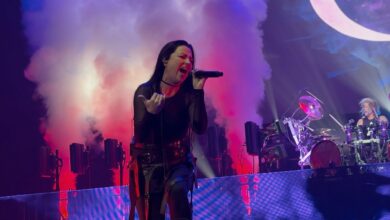Drums of Valor: When the Royal Marines Reimagined Iron Maiden’s “The Trooper” at Royal Albert Hall
In March 2024, London’s Royal Albert Hall hosted a breathtaking spectacle: Nicko McBrain—the thunderous drummer from Iron Maiden—joined the Massed Bands of His Majesty’s Royal Marines. Together, they debuted “The Maiden Legacy,” a medley that fused martial pomp with iconic heavy-metal power, marking a thrilling collision of two musical worlds.
The centerpiece began with a reimagined take on “The Trooper.” The piercing brass fanfares of the Royal Marines gave the piece a militaristic grandeur, only to be matched by McBrain’s pounding drum dynamics. The result was both familiar and refreshingly transformative: a patriotic twist on an adrenaline-charged rock anthem.
McBrain’s drum kit—dubbed “Legacy of Royals”—was a masterpiece in itself. Crafted by The British Drum Company, each drum was adorned with images of Iron Maiden’s mascot Eddie dressed in Royal Marines uniforms throughout history: from 17th-century marines to modern parades. The visuals added theatrical grandeur to the performance.
The medley didn’t stop at “The Trooper.” McBrain and the Royal Marines wove in “Run to the Hills” and “Wasted Years,” creating “The Maiden Legacy.” The transitions were seamless: brass and strings underscored, while electric energy resonated atop, blending rock riffs with the precision of military musicianship.
Before this iconic moment, McBrain had a personal journey of resilience. He suffered a minor stroke in early 2023 that temporarily impaired his right hand, and not long before that he beat stage-1 laryngeal cancer. His return to palpable emotion—each beat symbolized a victory over hardship. Watching him command the stage again, especially in such a dignified and dramatic setting, was deeply moving for fans and fellow musicians alike.
Rehearsals took place at HMS Temeraire’s Royal Marines School of Music in Portsmouth. According to McBrain, nerves ran high—his right hand was still regaining strength, and performing alongside a 100-piece military ensemble presented a very different challenge from Iron Maiden’s arena shows. But that challenge turned into camaraderie as the musicians bonded over rhythm, respect, and sheer commitment to the craft.
The Mountbatten Festival of Music isn’t just a concert—it’s a storied tradition. Hosted annually to raise funds for military charities, the event showcases the full spectrum of the Royal Marines’ musical talent. This year, the blend of orchestral grandeur and rock defiance provided one of the festival’s most powerful and unexpected highlights in recent memory.
McBrain’s involvement with the Royal Marines Band Service didn’t come out of nowhere. He had attended the Mountbatten Festival previously and was struck by how the Marines didn’t shy away from contemporary music—even incorporating The Prodigy and Queen into their setlists. Inspired by that boldness, he agreed to collaborate and bring Iron Maiden into the fold.
When the show began, the energy was electric. The Royal Albert Hall audience, used to stately processions and ceremonial marches, erupted in cheers as the familiar gallop of “The Trooper” rang out, transformed by horns and percussion. McBrain’s drum entrance was timed to perfection, sending a shockwave of adrenaline through the crowd.
Visually, the performance was just as spectacular. The “Legacy of Royals” drum kit, gleaming under the stage lights, served as both instrument and artwork. Each drumface depicted a different era of the Royal Marines through Eddie’s mischievous, defiant visage. It was a fusion of Iron Maiden iconography and military pride—historic, humorous, and heroic.
The drum kit didn’t remain just a stage piece. Following the performance, it was auctioned off to benefit the Royal Marines Charity and the Grand Order of Water Rats. The sale transformed this one-of-a-kind instrument into a legacy item—raising substantial funds while immortalizing a once-in-a-lifetime musical moment.
The collaboration between McBrain and the Royal Marines wasn’t just technically impressive—it was heartfelt. McBrain called it one of the great honors of his life, and Lieutenant Colonel Huw Williams, the Royal Marines’ Principal Director of Music, praised the energy and enthusiasm McBrain brought to every rehearsal and performance.
Amid the broader program, which also included poignant dedications like “Invictus” for wounded veterans, “The Maiden Legacy” stood out as a thunderous expression of unity through music. It was proof that rock and regiment can stand side by side, each lending strength and soul to the other.
McBrain is no stranger to large-scale collaborations—he’s performed with Iron Maiden at global festivals and stadiums for decades. But this was different. Instead of pyrotechnics and mosh pits, he was surrounded by ceremonial uniforms, precision marching, and full brass orchestration. The effect was stunning: Iron Maiden reimagined with majesty.
The performance echoed something deeper: resilience. For McBrain, recovering from stroke and illness, this event symbolized renewal. For the Royal Marines, it was an embrace of boldness and modernity. And for the audience, it was a celebration of two worlds blending in perfect time and tune.
That unforgettable evening at Royal Albert Hall brought together centuries of tradition and decades of rock rebellion. With the regal might of the Royal Marines and the relentless energy of Nicko McBrain, “The Maiden Legacy” wasn’t just a performance—it was a statement. A symbol of resilience, respect, and sonic power, it proved that even the most unlikely musical worlds can collide in harmony and make history.





